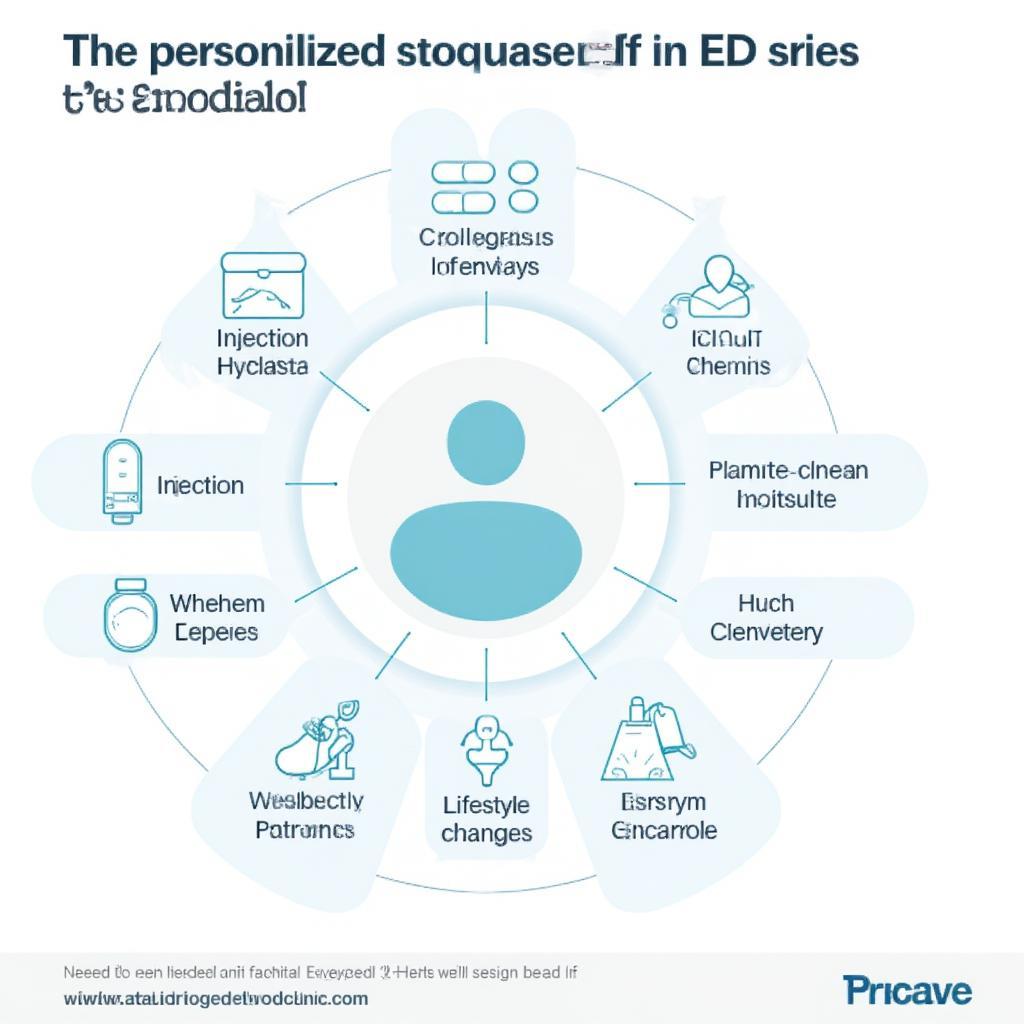Navigating Your Health: Understanding Men’s Clinic Medication Options

The world of men’s health can sometimes feel like a maze, especially when it comes to medical treatments. If you’re exploring options for various health concerns, understanding what medications a men’s clinic might offer is crucial. This article aims to shed light on common medications, the conditions they treat, and what to expect during the process. We will discuss how men’s clinic medication can be an essential tool in helping men maintain optimal health and well-being.
Common Conditions Treated at Men’s Clinics
Men’s clinics often specialize in addressing a range of health issues that uniquely affect men. These can include:
- Erectile Dysfunction (ED): Difficulty achieving or maintaining an erection can be frustrating and impact self-esteem.
- Low Testosterone (Low-T): Characterized by fatigue, decreased muscle mass, and reduced libido, low testosterone can affect men’s overall health and vitality.
- Premature Ejaculation (PE): This condition can lead to anxiety and frustration related to sexual performance.
- Hair Loss: Many men experience male pattern baldness, and there are treatments to slow or reverse hair thinning.
- Prostate Issues: Benign prostatic hyperplasia (BPH) and other prostate conditions can affect urinary health.
These are just some of the common health concerns; many clinics offer additional support for general well-being, including dietary advice and exercise recommendations. Knowing what specific conditions are targeted helps you better understand the different men’s clinic medication options available.
Types of Medications Offered at Men’s Clinics
The medications prescribed at a men’s clinic will vary depending on the diagnosis and individual health needs. It’s important to emphasize that any medication should be prescribed by a qualified medical professional after thorough assessment. Here’s a look at some common types of medications:
Treatments for Erectile Dysfunction (ED)
Medications for ED primarily work by improving blood flow to the penis. Common examples include:
- PDE5 Inhibitors: Sildenafil (Viagra), tadalafil (Cialis), vardenafil (Levitra) are popular choices. These drugs relax muscles in the penis, allowing blood to flow more easily, resulting in an erection when stimulated.
- Alprostadil: This is a synthetic prostaglandin E1, which can be injected directly into the penis or inserted as a suppository to cause an erection.
The choice of medication depends on several factors, including individual health conditions, lifestyle, and the doctor’s recommendations. Speaking with a healthcare provider at a universal men’s clinic is the first step in understanding which medication is best for you.
Prompt: A close-up shot displaying various pills, including sildenafil (Viagra) and tadalafil (Cialis) , representing the common ED medications available at men’s clinics. The focus is on clarity and the diverse treatment options available to men.
Medications for Low Testosterone (Low-T)
Testosterone replacement therapy (TRT) is the primary approach to managing low testosterone. TRT can be administered through different methods:
- Injections: Testosterone is injected directly into the muscle, usually every 1-2 weeks.
- Gels or Creams: Topical application allows testosterone to be absorbed through the skin.
- Patches: A patch applied to the skin gradually releases testosterone.
- Oral Medications: While less common due to potential liver effects, oral testosterone options do exist.
Dr. Thomas Ashton, an expert in men’s health, notes, “TRT is a powerful tool, but it must be monitored closely. Regular check-ups are crucial to ensure that hormone levels are balanced and that any side effects are promptly addressed.” Before starting any TRT plan, it’s wise to explore all the options at a men’s health clinic trt to find the best fit.
Treatments for Premature Ejaculation (PE)
Medications for PE are often focused on delaying ejaculation. Common choices include:
- Selective Serotonin Reuptake Inhibitors (SSRIs): Medications like paroxetine, sertraline, and dapoxetine (a rapid-acting SSRI approved specifically for PE) can help delay ejaculation by affecting neurotransmitters in the brain.
- Topical Anesthetics: Creams or sprays with lidocaine or prilocaine can desensitize the penis, thereby prolonging intercourse.
Hair Loss Treatments
For male pattern baldness, medications can help maintain or regrow hair.
- Minoxidil: This topical solution is applied to the scalp and can stimulate hair growth.
- Finasteride: An oral medication that reduces the hormone DHT, which contributes to hair loss.
It’s important to note that hair loss treatments take time to show results and need to be used consistently. Seeking advice from a clinic, like the apex men’s clinic, can help determine the most appropriate plan.
Medications for Prostate Issues
Medications for prostate conditions can vary based on the issue itself.
- Alpha-blockers: These relax the muscles in the prostate and bladder neck, easing urination problems related to BPH.
- 5-alpha-reductase inhibitors: These can reduce the size of the prostate, especially in cases of BPH.
The Consultation Process
When you visit a men’s clinic, the process typically involves:
- Initial Consultation: You’ll discuss your symptoms, medical history, and lifestyle with a doctor or healthcare provider.
- Physical Examination: A physical exam may be conducted to evaluate your overall health.
- Diagnostic Testing: Blood tests or other screenings may be used to diagnose and identify the underlying condition.
- Personalized Treatment Plan: The doctor will create a treatment plan tailored to your specific needs, including prescribed men’s clinic medication when appropriate.
- Follow-up Care: Regular follow-up appointments are essential to monitor the effectiveness of the treatment and make adjustments if necessary.
Prompt: A friendly male doctor is shown explaining medical details to a male patient, holding a digital tablet displaying test results, showcasing an interaction that can happen at a men’s clinic consultation for men.
Understanding Medication Safety and Side Effects
It’s essential to be informed about the potential risks and side effects associated with any medication. Here are a few important points:
- Talk to Your Doctor: Always discuss potential side effects with your doctor before starting medication.
- Report Side Effects: If you experience any unexpected or concerning side effects, notify your healthcare provider immediately.
- Follow Directions: Take medications precisely as prescribed to ensure effectiveness and minimize side effects.
- Medication Interactions: Be sure to discuss all other medications and supplements you are taking, as some might interact negatively.
“Understanding your medication is part of managing your health effectively,” advises Dr. Sarah Chen, a specialist in men’s health. “Don’t hesitate to ask your doctor questions, and never feel embarrassed about seeking clarification.”
Finding the Right Men’s Clinic for You
Choosing the right men’s clinic is essential to getting appropriate care. Here are some tips to consider:
- Research Clinic Specialties: Make sure the clinic specializes in the health issues you’re concerned about.
- Check Credentials: Look into the qualifications and experience of the healthcare providers at the clinic.
- Read Reviews: Look at patient testimonials to understand the experiences of other patients.
- Assess Accessibility: Consider if the clinic is easy to access and if they offer convenient appointment times.
You might find a suitable clinic when searching for a nearest mens clinic, or even a “well man clinics near me.” Location shouldn’t be the only factor, however. The focus should be on high-quality care and a comfortable setting.
Alternative and Complementary Therapies
While medications play a crucial role in treatment plans, many men find complementary therapies and lifestyle changes beneficial. These may include:
- Regular Exercise: Exercise can help improve overall health, boost testosterone levels, and improve blood flow.
- Healthy Diet: Eating nutritious food can impact various aspects of men’s health.
- Stress Management: Techniques like meditation, yoga, and deep breathing can lower stress levels and help manage certain conditions.
- Counseling or Therapy: Addressing emotional and psychological factors can be beneficial for men’s overall well-being.
Integrating complementary therapies can support the effectiveness of men’s clinic medication and improve overall health outcomes.

Prompt: The image depicts a man engaged in a light workout, complemented by a background including nutritious food and greenery, representing a health-conscious lifestyle often advised to men attending health clinics.
How to Navigate the Costs of Medication
The cost of medications can sometimes be a barrier for some people. Here are some tips for managing the cost:
- Check Insurance Coverage: See if your insurance plan covers prescribed medications at a universal men’s clinic or other clinics.
- Compare Prices: Medication costs can vary between pharmacies, so it’s wise to shop around.
- Generic Options: If available, opt for generic versions of brand-name medications.
- Discuss Payment Options: Inquire about payment plans or options for reduced costs at the clinic.
Staying Informed and Empowered
Taking care of your health is an ongoing journey. The medications offered at men’s clinics can be incredibly helpful, but only one part of the puzzle. Here are final suggestions:
- Educate Yourself: Understand your health conditions, treatment options, and potential outcomes.
- Stay Informed: Keep up with new developments and advancements in men’s health.
- Seek Support: Do not hesitate to seek out the necessary help from friends, family, or professional support groups.
By proactively engaging in your healthcare and working collaboratively with your health provider, you can make informed decisions and take control of your well-being. Remember, taking charge of your health starts with seeking out the necessary information and care. Understanding the different facets of men’s clinic medication is vital for this process.
In conclusion, men’s clinic medication provides a range of treatment options for various health issues. From addressing erectile dysfunction to managing low testosterone and beyond, there are personalized solutions available. By proactively seeking the right care, and understanding the role of medication, men can significantly improve their health and well-being. Remember that regular check-ups, clear communication with your healthcare provider, and a healthy lifestyle are vital components to ensure positive outcomes.




